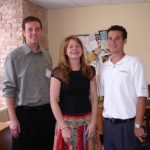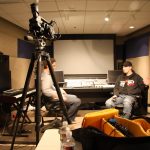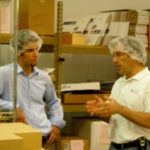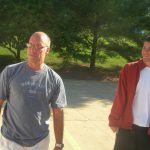Interview: How To Open A Bookstore
I have a couple lives. I have a whole arts career in downtown Phoenix, which is separate, but is related to Changing Hands. It might sound schizophrenic.
When I moved here, I did not like living in Arizona. So I got involved in the arts community in downtown Phoenix.
My undergraduate degree is in marketing, my graduate degree is in creative writing. I found that I was able to start marrying the two by doing text art, photography based art work and hand made books. I got very involved in the Phoenix arts community, very involved in the community development.
Actually, got involved in buying what were former crack houses and turning them into art spaces. Now we have this really amazing, vibrant neighborhood with a great art walk. Lots of things going on.
I find that I don’t get to do art as much because I find I do more dry walling. And community development. And city meetings. But that’s okay because it’s creative in itself.
I’ve always been passionate about books. So the mixture of visual art and the community that creates in books. Because books is a very solitary culture. You read by yourself. Mirroring the visual arts, because you always get to be in galleries, was a great combination.
So I did this exhibit called Matter. Essentially I took these photographs of myself when I was a child and blew them up. They were about 72 by 72. They were black and white with a superimposed text of who I thought I was going to be when I was that age. The first one started out when I was in nursery school, my grandmother said to me, “Never become a wife. You should always become a mistress. Because mistresses never have to darn socks and they always get jewelry. And they get their own apartment.” So I had this advice from a very cool, radical grandmother about always taking this odd route. And I do think I ended up coming back to that advice.
Later on, the next picture of myself was around the age of 7. I thought I’d get married to a lawyer or a doctor and have a bunch of kids and have my greatest accomplishment being the president of the PTA. I came from a culture where that was my trajectory. That’s what I was supposed to do.
Then I started traveling internationally and I thought I would then be an Olympic medalist, travel the world, save the world, save the planet, solve peace in the Middle East…I think everybody in their late teens, when they realize they have an opportunity to make the world better, have big ideas. And I certainly got caught up in that.
Then I hit my twenties and started going out after work. That’s when idealism goes by the wayside. But then it starts to become rational that you want to make the world better, you want to get involved, you want to work with your passion, but you also have to pay the bills.
In many ways I ended up back where I started without realizing it.
Because of the sprawl, it was really difficult to meet people here. It’s hard to find the likemindedness. I basically hated it. Every time I had to renew my car license, or registration, I would say, “Okay. I’m on a two year plan. I’m on a two year plan.” Although, probably for my first six years, I only renewed it for one year because I was convinced that I was going to leave.
Then I realized I didn’t know where to go, where life would be that different. Because I think in many ways, we live the same lives in many places. We watch the same TV shows, we eat the same type of food. And we find our network of people. It was more up to me to find the life here.
So I got very involved in this growing arts community in downtown Phoenix. At the same time I got very involved in what my passion was, which was working in a bookstore.
Bookstores have this tiny profit margin, and it’s really an act of passion and love. But, being able to take my marketing background into my passion was probably one of the best things that ever happened to me.
By following the things that I enjoyed most, which was the arts community and books, I was able to find a community. And now I have this…I look around at the people I talk to and hang out with and I’m like…in no major city would I be hanging out with this group of people. I get to do things here that I couldn’t do anywhere else. Like I couldn’t buy property in New York, and renovate it and build a community.
You know, I get to go to a party and there’s the Mayor. You can’t do that in any other city. Phoenix is interesting right now because it’s the right city at the right time. It’s a catalyst. There’s so much happening here and there’s so much opportunity. We can’t find it sitting on our couch watching Survivor. We can’t always find it in the bar. But we can find it by engaging and stepping outside of our comfort zone. I think you find an interesting life here.
Do you remember a point where you stopped basing what you thought you were going to be based on external things that were happening to you?
That point in my early twenties where I was engaged in this life, but at the end of the day I didn’t think I was happy. At the end of the day I just wasn’t…I just wasn’t doing the things that I wanted to be doing. And then, by stepping out of my comfort zone, and seeing it really wasn’t that hard to do other things and engage in things that I found interesting.
But I find that every couple of years I look back and I’m still surprised at where I ended up. Like General Manager of a bookstore? I kicked and screamed that I swore I never would be doing that. I didn’t want to manage people, I just wanted to manager events. And to create marketing and be the cool person. Not be the manager of a bookstore.
But it’s like every year you get smarter and you learn things and you face a new challenge. I never thought I’d be someone who would go to city meetings and get involved in city policy and local businesses. As much as it’s not my favorite part of the day, it makes me so much smarter and you meet amazing people by doing something that you didn’t think you were going to do.
So I no longer say, “I have no idea what I’m going to be doing when I’m 60.” I hope I get to relax a little bit more, but I really thought I’d be taking cool vacations in the Bahamas. And I don’t have that life at all…I barely vacation. But my daily life is pretty amazing. I compare it to people who go to work and at the end of their life they have ski trips and hiking trips, and they do all of that. And I think that’s great too. But those to me are the two choices you make. You either find passion in your work, if you’re very lucky you’ll have both, you either find passion in your work and you probably don’t make as much money to take the cool trips that you want to take, or you don’t have passion in your work, but you have passion in your personal life. I’ve luckily been able to find a passion in my work that gives me both. Just without the vacations.
So you didn’t get it until you got out of your comfort zone. Is that taking a leadership role?
I loved marketing, that was my comfort zone. I reached a point where it was redundant. I was doing the same thing over and over and over again. I could keep inventing cool things for this store, but at some point they start becoming the same. So my choice was to go to another company and do marketing, but probably without books or arts, and without the people and the community that is around books and arts, or I can take a different position in the company that I want to stay in. And that’s where I had to step out my comfort zone.
But what’s been great and informative is thinking that I wouldn’t have fun at my new job, but the huge leap is…marketing is such a cool job. It is. You get to bring parts of that to managing. I think a lot of people who come out of managing school without the creative side just have a different take on it. It’d probably be worth it talking to the staff and seeing how they feel about their new general manager. The feeling is good right now.
If marketers don’t know how to communicate, we fail.
You’re not the cool guy anymore when you’re the general manager. You’re the person that could fire and hire (Laughs). The marketing part of it is, you bring Senator Obama to town and you are so cool (Laughs).
What’s everything you’re involved in, starting with the crack houses?
Starting with the crack houses. Basically we bought some crack houses in downtown Phoenix- what’s interesting is that we put more money into fixing them up than the actual purchase price for the building. We were very fortunate…we might look smart now, but we were very fortunate that other people were doing the same thing at the same time in our neighborhood. The building of the America West Arena, the building of BankOne Ballpark at that time pushed so many artists out of that neighborhood that people started purchasing and buying properties. So when we bought in our neighborhood, and thirty days later it was deemed to be Cardinal Stadium, they couldn’t kick everyone out because they actually owned. So that’s why the stadium is in Glendale.
So it was about starting an arts collective and paying rent instead of art for sale. Artists are great because they know how to dry wall, they know how to paint, they are used to doing hard work to get something done. That got so popular that we opened a second arts collective down the street. And a third. We bought another building that the contractor said looked worse than Baghdad.
Taking a step back, I’m not a trust fund baby. The way I did it was a very unconventional way. At the time, I was getting lots of credit card offers with zero down. So I actually bought my first building by taking all the money off on a credit card, and then refinancing the building six months later and paying back the credit card. I don’t think that option exists anymore. I haven’t seen those offers right now.
I didn’t know it was going to happen, where I could pay my mortgage with a team of artists.
Everything was going great, First Fridays are now one of the largest art walks in the country. We’re working on Third Fridays, which is a more grown up, gallery night. We’re working on Every Friday, getting more restaurants than bars, but what we noticed in using old, adaptive spaces, is that we were violating city code. Because all of city code in Phoenix is written towards the suburbs and sprawl. So I didn’t want to get involved, and I didn’t want to go to city meetings, but I also felt I had no choice. Or else I might lose my property.
I went to city meetings, and I had no voice, and I quickly learned through talking to people in the room that you need to be something. Corporation, community, or a partnership. So a bunch of us got together and paid to be a non profit organization, Roosevelt Row, a city development corporation. Suddenly we got a seat at the table, and we got invited to meetings with the Mayor’s Office and city managers about how to develop downtown Phoenix.
People in Arizona love a street culture. The community has supported us so much that the city realized they couldn’t have the downtown they thought they should have. But we should have a downtown with artists and small businesses.
Why didn’t you leave because it was too much of a pain?
Wow…I don’t know if I have an answer for that (Laughs). That’s a really hard question. Every day I woke up and said, “I’m going to leave. I’m going to leave.” But honestly, at that point I had sunk more money into my buildings than they were worth, because we had to get the crack pipes off the floor. I would have left deeply in debt without any money.
So what have you learned through creating these communities?
Wow…good question. Because I always ask myself if I would do it again. I definitely learned that one person can make a difference. I learned that a small group of people are very, very powerful. Sitting on a couch and complaining about why a place sucks, or making the argument that New York is better, doesn’t do anything except make someone miserable. It’s not that hard to engage and get involved, but it is to step outside your box.
What I’ve learned is that if you get outside your comfort zone and introduce yourself, saying you’re new, what you need, what you want, which is basically how to sustain, you know, meeting people, that things happen. You can actually have this life that you want to have.
There’s hard days when it just feels like nothing is going to work. The economy. You’re in a retail business, the economy tanks, what do you do? But that also gives you a challenge, an opportunity to see what you have to do to our business.
A poor thing about working for a locally owned company is that you’re not going to make the big money that you could make in a corporation. Like a chain book store, one buyer buys for 500 stores. So you could make a really good salary. But when you work for a small store, you’ll never have that. But at the same point, the economy starts tanking, and I want to do something different, we have a conversation with a couple people and we start moving book cases and put in a pet boutique. Or a baby boutique. Or an edgy book display, or rock bands. That’s what exciting about making the choice to work for a small company. You can make a pivotal change in a moment.
Would you rather be the kick ass small company, like a Bianchi’s Pizza with a four hour wait all the time, or a large corporation with millions of dollars?
You can make mistakes, and they’re not colossal mistakes. As hard as mistakes are, you just grow leaps and bounds. It’s like aging ten years every time you make a mistake. But in a good way.
That’s part of the risk thing too. I had a teacher, Allen Ginsberg, who said, “Give yourself permission to make mistakes.” It was probably one of the best pieces of advice I’ve ever heard. Because no one else will give you permission to make a mistake.
Will my employees ever make $100, $200 thousand a year? Never. Will they create events that people will talk about forever? Absolutely.
One piece of advice?
Be careful who you make out with in bars, because you might end up working with them one day (Laughs).
When you’re young and trying to build a career in those first five years, you can’t forget that you never stop working. Those you come across and make an impression on, those who you meet…every great thing I know that’s happened to people has happened because of who they met. Not necessarily because a course they took. But it is who you know, checking your ego, and not getting drunk in public. I know that sounds so minimal. I wasn’t that awful, but it was advice I wish I had gotten in my early twenties. That you are always working when you’re trying to build your career. All the time.
I think there’s a lot of people who don’t necessarily want to take all the credit, but they get out of school and feel like they have to do everything themselves.
There’s bad bosses and bad managers out there- no doubt about it. I would take the opportunity to work for a great leader and make less money, than work for a mediocre boss who couldn’t teach me anything.
When I go to hire, I choose problem solving over book knowledge. Any day. At the end of the day, this is retail. But the questions aren’t, “Do you have a small, medium, or large?” The questions here are “I know the cover is blue and I know the word ‘cat’ is in the title. Help me find that book.” You don’t have to know every book, but you have to know how to problem solve it.






